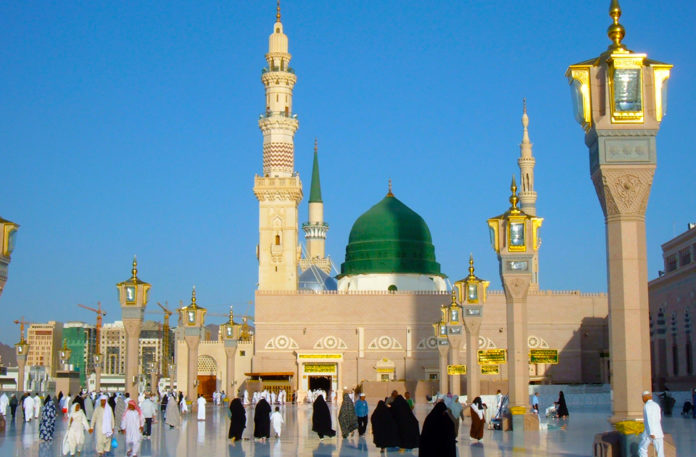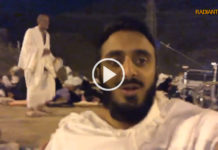The Seerah has a number of unique features which make studying it a source of spiritual and intellectual pleasure. Studying it is essential for all scholars of shari’ah, daa ‘iyahs who call people to Allah and those who are concerned with social reforms, to ensure that Islam will be conveyed to the people in a convincing manner, so that they will know that it is the refuge to which they should turn at times of trouble or confusion, so that the people’s hearts will be open to the daa ‘iyahs and the reforms promoted by the reformers will be more successful and more sound. We will sum up below the most important and unique features of the Prophet’s biography.
Firstly: It is the soundest account of the life of any Prophet who was sent, or any great reformer. The biography of the Messenger of Allah has come to us via the soundest academic methods and with the strongest proof as we shall see when we examine the sources of the Seerah which leaves no room for doubt concerning the major events of the Prophet’s life. This makes it easy for us to detect fabricated accounts, that were added in later times of miracles or events dreamt up, by ignorant minds who wanted to add more of an element of the extraordinary to the life of the Messenger of Allah , over and beyond that which Allah had decreed of his high status, the sanctity of his mission and the greatness of his character.
What is unique about the soundness of the Seerah is that it is proven, and there cannot be any doubt about it; this is something which cannot be said of the biography of any of the previous Messengers of Allah. In the case of Moosa (Moses) (may Allah’s peace be upon him), the true events of his life are mixed with the fabrications introduced by the Jews, so we cannot rely on the extant Torah in order to find a true picture of the life of Moosa. Many western critics have also started to complain about some of the books of the Pentateuch, and some of them have stated clearly that some of its books were not written during or soon after the lifetime of Moosa, but rather they were written long after he had died, by an unknown author. This alone is sufficient to cast doubts upon the soundness of the life of Moosa as narrated in the Torah. So the Muslim can only believe in the details of his life that were narrated in the Qur’an and the saheeh Sunnah.
The same may be said of the life of ‘Eesa (Jesus), for these Gospels which are officially recognized by the Christian churches are those which were only approved of hundreds of years after the time of the Messiah; they were chosen without any academic basis from among hundreds of Gospels that were in circulation among the Christians at that time. Moreover, the attribution of these Gospels to their supposed authors cannot be proven in any scientific manner that would give peace of mind. They were not narrated through any chain of narrators that goes back to their authors. There is also some dispute among western critics concerning the names of some of these authors who were they, and when did they live?
If this is the case regarding the biographies of Messengers connected to religions that are widespread in the world, the element of doubt is even stronger regarding the founders of other religions and philosophies of hundreds of millions throughout the world. The stories told by the followers of Buddha and Confucius about their lives have no sound basis from the point of view of academic research. Rather, the priests accepted them blindly from one another and each generation added more elements that were akin to myths and legends. No enlightened mind that is free from blind-following of these religions can accept these myths.
Hence, we find that the soundest biography, the one which has the strongest proof and was narrated in the most reliable fashion, is the biography of Muhammad, the Messenger of Allah.
Secondly: The life of the Prophet is well known at all stages, from the marriage of his father ‘Abdullah to his mother Aaminah, until his death. We know a great deal about his birth, his childhood, his youth, how he earned his living before his Prophethood began, and his travels outside Makkah until Allah sent him as a Messenger. After that point, we know in more precise details all about his life.) year by year, which makes his biography as clear as the sun. As some western critics said: Muhammad is the only one who was born in the light of the sun.
This is something that is not even remotely available with regard to any of the previous Messengers. In the case of Moosa, we do not know anything at all about his childhood or youth, or how he earned his living before he became a Prophet, and we know only a little about his life after he became a Prophet, not enough to form a complete picture of his personality. The same may be said of ‘Eesa. We do not know anything about his childhood, except what is mentioned in the Gospels that exist now, which say that he entered the Temple of the Jews and debated with their rabbis. This is the only event which they mention of his childhood. We do not know anything of his life after his Prophethood began, apart from matters that have to do with his call, and a little about his way of life. Apart from that, it is as if the matter is covered with a thick fog.
How can we compare this to the sound sources of the Seerah, with their precise details about the personal life of our Messenger, such as how he ate, drank, stood, sat and dressed, his shape and appearance, how he spoke and interacted with his family, how he worshipped and prayed, how he dealt with his Companions. The details of his biography are so precise that they even narrated how many white hairs there were on his head and in his beard.
Thirdly: The biography of the Messenger of Allah tells the life story of a man whom Allah honoured with the role of a Messenger. The Seerah does not try to make him more than human, or add myths and fables to his life. No divinity is ascribed to him in any way, whether major or minor. If we compare this to the stories that the Christians tell about the life of ‘Eesa, or that the Buddhists tell about Buddha, or that the idol-worshippers tell about their gods, it will become clear to us that there is a huge difference between the biography of the Prophet and the biographies of these other figures. This has a far-reaching effect on the human and social behaviour of their followers, for the claims of divinity accompanying ‘Eesa and Buddha made them unsuitable examples for people to follow their personal and social lives. Contrary to that, Muhammad remained and will remain the perfect human example for everyone who wants to live a happy and decent life on the personal, family and social levels. Hence, Allah says in His holy Book:
| “Indeed in the Messenger of Allah [Muhammad] you have a good example to follow for him whose hope is in Allah and the Last Day…” (Qur’an 33: 21) |
Fourthly: The biography of the Messenger of Allah includes all aspects of human life. It tells us the story of Muhammad, the trustworthy and righteous youth, before Allah honoured him with the Message. It also tells us the biography of the Messenger of Allah who called people to Allah, seeking the best means of conveying his Message and striving his utmost to do so. It tells us his biography as the leader of a state, establishing the best system for his state, and protecting it by his alertness, sincerity and honesty in order to guarantee its success. It tells us his biography as a husband and father, with his compassion and kind treatment, clearly setting out the rights and duties of husbands, wives and children. It tells us his biography as an educator and guide who gave his companions an exemplary training and education, by means of which he transferred from his soul to theirs that which made them follow his example in all matters, both major and minor. It tells us his biography as a friend who fulfilled the duties of friendship, satisfying its obligations and observing its etiquette, which made his companions love him more than they loved themselves and more than they loved their families and relatives. His seerah tells us the story of a brave warrior, a victorious leader, a successful politician, a trustworthy neighbour and a faithful ally.
To sum up: The biography of the Messenger of Allah includes all aspects of human life and interaction with society, which makes it the best example for every daa ‘iyah, every leader, every father, every husband, every friend, every teacher, every politician, every head of state, and so on…
We do not find anything like this comprehensiveness, not even anything that comes close, in what is left of the biographies of the previous Messengers and founders of ancient and modern religions and ideologies. Moosa is the example of a national leader who saved his nation from slavery and expounded principles and laws that suited that nation only. But we do not find in his life-story anything that makes him an example for warriors, teachers, politicians, heads of state, fathers or husbands.
‘Eesa represents the ascetic daa’iyah who, when he left this world, had no wealth, no house and no possessions. But according to his life-story as it is extant among Christians, he does not represent a war leader, a head of state, a father, a husband because he never married, a lawgiver or any of the other roles represented in the life of Muhammad. The same may be said of Buddha, Confucius, Aristotle, Plato, Napoleon, and other great men of history. They are fit to be examples if at all in only one aspect of life where they achieved distinction and for which they are known. The only man in history who is fit to be an example for all groups, for all talented people in all aspects of life, is Muhammad.
Fifthly: The biography of Muhammad is the only one that can give us proof beyond any shadow of a doubt about the truthfulness of his message and Prophethood. It is the biography of a perfect man whose call went from victory to victory, not by way of extraordinary feats and miracles, but in a purely natural way. For he began his call and was persecuted; he conveyed his message and gained supporters; he was forced to fight so he fought; he was wise and successful in his leadership. By the time his death drew near, his call has spread all over Arabia, by means of conviction, not by means of suppression and force. Whoever knows the customs and beliefs that the Arabs used to follow, and the attempts they made to silence his da ‘wah, even plotting to assassinate him, and how unequal was the match between him and his opponents in every battle he won, and the short time it took his message to prevail before he died, which was only twenty-three years, will be certain that Muhammad was indeed the Messenger of Allah, and that Allah would not have blessed him with steadfastness, strength, influence and victory if he were not indeed a true Prophet. Allah would not have given this support, which is unique in history, to one who told lies about Him. The life-story of the Messenger of Allah proves to us that his message is true from a purely rational point of view. The miracles that happened to him are not the main reason why the Arabs believed in his call. In fact we do not find any miracle that made the stubborn kuffaar (unbelievers) believe, even though physical miracles are proof against those who witness them. It is certain that the Muslims who did not see the Prophet or witness his miracles, believed in the truth of his message because of the definitive rational evidence that attested to the truth of his claim to Prophethood. This rational evidence includes the Qur’an, which is an intellectual miracle that makes every intelligent and fair-minded person believe that Muhammad’s claim to be a Messenger is true.
This is utterly different from the life-stories of the previous Prophets as preserved among their followers, which indicate that people believed in them because of the miracles and extraordinary feats that they saw at their hands, without thinking in a rational way about the principles of their calls, or submitting to them on the basis of reason. The clearest example of that is the Messiah, for Allah tells us in the Qur’an that the main reason why the Jews believed his message was that he healed the blind, the lepers and healed the sick, raised the dead, and told them what they were eating and what they were storing in their houses. He did all of that by Allah’s leave. The Gospels that are currently extant tell us that these miracles were the only reason why the masses believed in him all at once, not that he was a Messenger as the Qur’an tells us, but that he was God and the son of God exalted be Allah above that. So after the time of the Messiah, Christianity spread because of miracles and extraordinary feats, and the Acts of the Apostles is the greatest evidence of that. So it is true to say that Christianity to its followers is a religion based on miracles and extraordinary feats, not on intellectual conviction.
Hence, we can see a clear difference between the life of ‘Eesa and that of Muhammad, because no one believed him as a result of seeing his miracles, rather they believed him on the basis of rational and intellectual conviction. Although Allah honoured him with miracles, that was by way of honouring him and refuting his stubborn and arrogant opponents. Anyone who studies the Qur’an will see that it is based on convincing by means of rational arguments and on calling attention to the visible signs of the greatness of Allah’s creation. Knowing that the Prophet was unlettered, makes his bringing the Qur’an a sign of the authenticity of his Prophethood. Allah says in Soorat al-‘AnkAbut:
| “And they say: ‘Why are not signs sent down to him from his Lord?’ Say: ‘The signs are only with Allah, and I am only a clear warner.’ Is it not sufficient for them that We revealed to you the Book [the Qur ‘an] which is recited to them? Verily, herein is mercy and a reminder [or an admonition] for people who believe.” (Qur’an 29: 50-51) |
When the kuffaar of Quraysh insisted on demanding miracles from the Messenger of Allah, as the previous nations used to do, Allah commanded him to answer them by saying:
| “And they say: ‘We shall not believe in you [O’ Muhammad], until you cause a spring to gush forth from the earth for us; Or you have a garden of date palms and grapes, and cause rivers to gush forth in their midst abundantly; Or you cause the heaven to fall upon us in pieces, as you have pretended, or you bring Allah and the angels before [us] face to face; Or you have a house of Zukhruf [like silver and pure gold], or you ascend up into the sky, and even then we will put no faith in your ascension until you bring down for us a Book that we would read.’ Say [O’ Muhammad]: “Exalted is my Lord! Was I ever but a human Messenger?”‘ (Qur’an 17: 90-93) |
| “… Exalted is my Lord! Was I ever but a human Messenger?” (Qur’an 17: 93) |
Listen to what Allah says in Soorat al-Isra’:
| “And they say: ‘We shall not believe in you [O’ Muhammad], until you cause a spring to gush forth from the earth for us; Or you have a garden of date palms and grapes, and cause rivers to gush forth in their midst abundantly; Or you cause the heaven to fall upon us in pieces, as you have pretended, or you bring Allah and the angels before [us] face to face; Or you have a house of Zukhruf [like silver and pure gold], or you ascend up into the sky, and even then we will put no faith in your ascension until you bring down for us a Book that we would read.’ Say [O’ Muhammad]: “Exalted is my Lord! Was I ever but a human Messenger?”‘ (Qur’an 17: 90-93) |
| “And whomsoever Allah wills to guide, He expands his heart to Islam…” (Qur’an 6: 125) |
Extracted from The Life of Prophet Muhammad: Highlights and Lessons Published by International Islamic Publishing House

SUBSCRIBE AND LEARN...
- Fresh articles
- Increase your Islamic knowledge
- Build a Powerful Connection with Allah





















